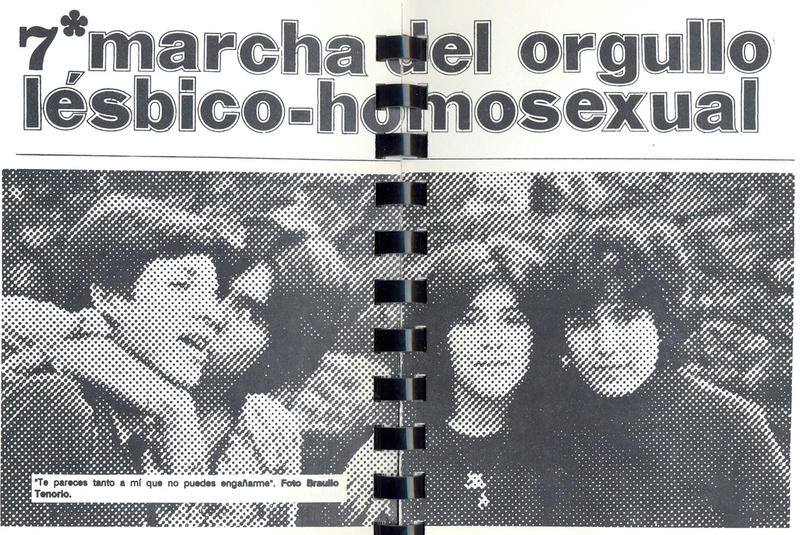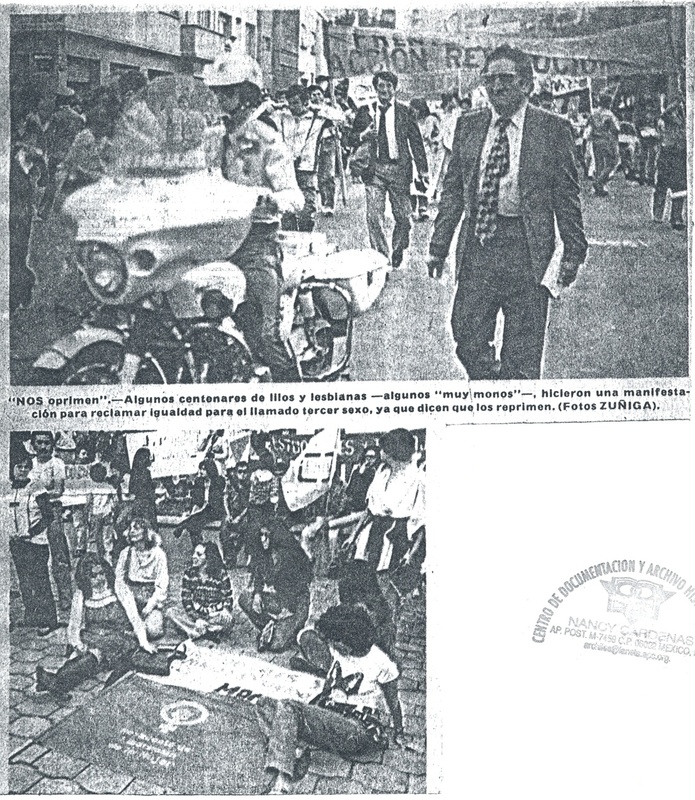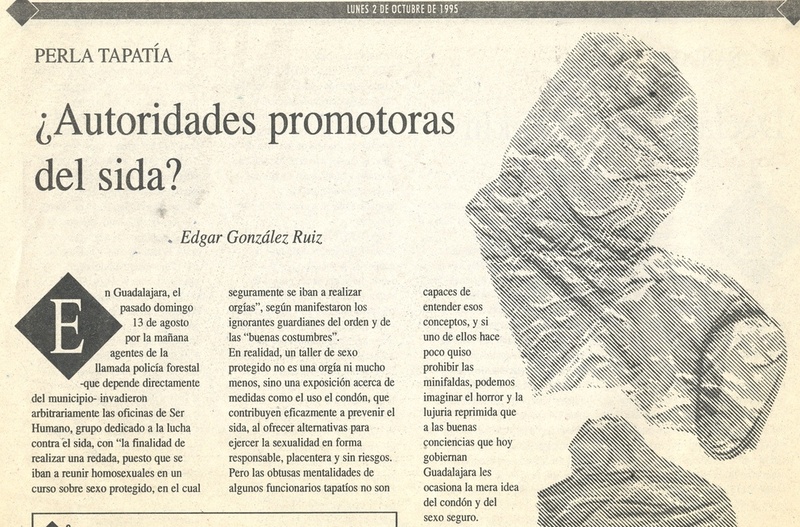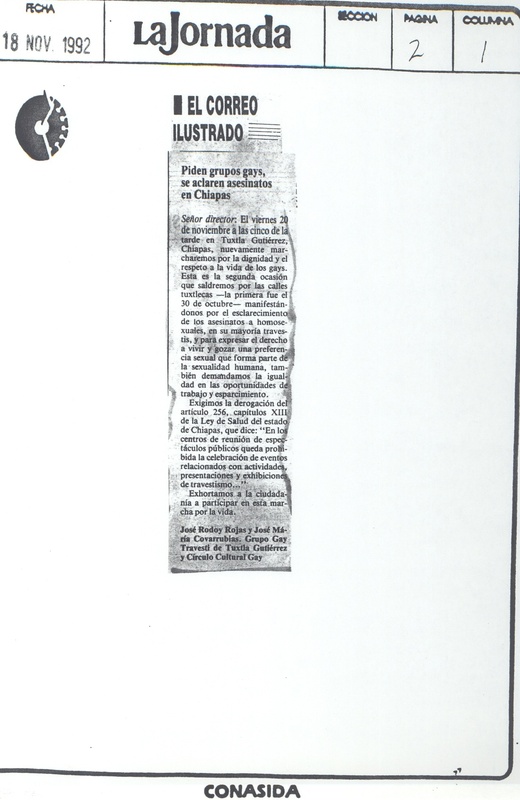LGBTQ+ Feminists Movements in Mexico
This exhibit is for everyone who is interested in learning more about the queer feminist movements that happened around Mexico. As a queer student born and raised in Mexico, I never learned much about any LGBTQ+ or feminist movement in school, and when we learned about sexual education, same-sex relationships were barely even mentioned. In truth, I learned about homosexuality through overseas tv-shows and online fanfiction I found one day rather than through school. But there is a big history of queer movements that aren't taught by the school system of Mexico because of the conservatory side of the country, homophobia, and, in some ways, the big influence the catholic church maintains. My hope is that through this exhibit viewers can learn more about the "hidden" part of my country, and realize how much impact and influence a queer feminists movement can have in a pretty conservative and Catholic nation.
We will be looking at, mostly, movements, marches, and protests relating to the fight against sida (or AIDS in English), equality, Marxist ideals, and the protection and respect of queer lives. For this, we will be looking at articles curated by two other feminist archives in Mexico, the Archivo Histórico de Lesbianas Feministas en México 1976-2020 by Yan María Yaoyólotl, and the Identidad, diversidad, disidencia y derechos sexuales (1936-2011) by Nancy Cárdenas.
In this artifact, we have a depiction of the famous feminist and queer icon Frida Kahlo. Frida has been considered a Latino queer-feminist icon due to her achievements in the world of art back when it was considered mostly a male-driven industry, her involvement in politics, supporting the Marxist ideal, and speaking out for indigenous Mexicans, her presentation of self, showcasing a more masculine side of herself than what was expected of her back in her time.
Created and drawn by Yan María Yaoyólotl Castro, this drawing shows us Frida breaking gender norms once more by wearing a tuxedo while on a socialist protest against capitalism. During the era of the cold war and even later on, feminist and queer movements were tied and combined to anti-capitalist movements in Latino America. While these movements are more well known from places like Cuba, Mexico also had its fair share of socialist movements supporting Marxist ideals, more specifically Trotskyism. As depicted in the drawing, the banishment of Leon Trotsky to Mexico helped him leave a huge impact on anti-capitalist movements in the country. This impact can still be appreciated decades after his death, with chants such as "Socialism without Sexism" being heard during feminist manifestations.
The following artifact belongs to a cultural diary where different pictures and newspaper articles relating to the queer manifestations in Mexico are saved. The march that is being talked about in this picture, could nowadays be compared to a pride parade. The main difference was back then people were more likely to get arrested or harmed than they are now. There were many instances where these types of marches ended with multiple people arrested only for speaking out against their oppression and discrimination. It is because of such instances that new slurs were created to shame those who were gay. "41", "marica", "joto", "puto" and, "lilo", and even "travesti" are some examples of slurs dedicated towards Mexican homosexuals. But even after all the ridiculing and the added on oppression and discrimination, the LGBTQ+ community stayed strong and continued marching on the streets of Mexico while building a safe community of their own.
Continuing with this darker tone, we have a set of images with a ridiculing text as our next article. If observed carefully one can see a peaceful protest with a cop on front and, on the image below, a group of feminist protestors. As seen in the translation of the text, one can intuit the reaction of the conservative part of Mexican society to this manifestation for equality of gender and sexuality. Besides this, during the 1990s the queer Mexican community was struggling against the press, for constantly blaming the AIDS pandemic on the queer community, miss informing the public of how the disease spread, who was the ones affected by the pandemic, and how to protect oneself against the said pandemic.
Despite this, the LGBTQ+ community persevered and took matters into their own hands creating groups, courses, and presentations to teach their fellow citizens how to practice safe sex to stay protected and healthy while still getting their fair share of pleasure.
This artifact is part of a Newspaper article that was published in 1995. During this year, Mexican activists continued to fight against AIDS in every way they were able to. A group of representatives of the LGBTQ+ community sent a letter to, the then-president of Mexico, Ernesto Zedillo Ponce de León asking to increase the budget that was designated for the protection of and the fight against AIDS. But as there seemed to be an improvement in their fight, there were things bringing them down. The same government they were begging for help, tried to put them down, raiding their groups, interrupting their sexual education sources, and using anything and every single piece of evidence they could think of as a way to sabotage their process while still making it seem like a legal and rational manner and not something coming from irrationality.
Translation of newspaper article: "Are authorities promoting AIDS? In Guadalajara, this past Sunday morning, of August 13th, agents of the forest police —who depend on the county— invaded arbitrarily the office of Ser Humano, a group dedicated to the fight against AIDS, with 'intentions of raiding, because homosexuals were going to be reunited in a course about protected sex, in which orgies would probably occur', stated the ignorant law and 'good manner' protectors. In truth, a protected sex workshop is not at all an orgy, but rather a presentation about measures like the use of condoms, that contribute to the protection against AIDS, offering alternatives for having sex in a responsible, pleasurable, and safe manner. But the backward mentalities of some tapatió officials are not capable of understanding such concepts, and if one of them recently tried to abolish miniskirts, we can imagine the horror and repressed lust proked by the idea of condoms and safe sex, to the good minds that now govern Guadalajara".
On top of that hate crimes against queer Mexicans, specifically, ones in drag, were on the rise while state laws prohibited the presentation of drag, and other ways of expressing queerness, in public places. To stop this madness, activists in the state of Chiapas protested for a solution to the growing homicides of queer men. Joining together to showcase their lives matter and they deserve the bare minimum level of respect, standing strong as a community, they stood strong proving they would not rest until they reached their goals. And while it wasn't for nothing, Mexico, especially Mexico City, keeps being one of the places with the most homicides against homosexuals. But as long as there is a community, the fight will not stop until they have reached their goal.
Translation of newspaper article: "Gay groups ask for solving murder cases in Chiapas. Mister Director: On Friday, November 20th at 5 in the afternoon in Tuxtla Gutiérrez, Chiapas, once more we will be protesting for the dignity and respect of the lives of gay people. This is the second time we will march in the streets of Tuxtla —the first was on October 30th— protesting for the clarification of murder cases against homosexuals, mostly in drag, and to express the right to live and exercise a sexual preference that forms part of the human sexuality, we also demand the equality of opportunities in jobs and recreation. We demand the removal of article 256, chapter XIII of the Health Bill of the state of Chiapas, which states: 'In recreational spaces, it is prohibited the celebration of events related to activities, presentations, and exhibitions of drag...' We invite the public to partake in this protest for life".




